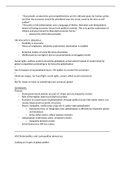- “That growth, productivity and competitiveness are the ultimate goals for human action,
and that the economic should be prioritized over the social, come to be seen as self-
evident”
- “The policy of de-politicization uses a language of liberty, liberalism and deregulation,
aimed at freeing economic forces from political controls. This is to get the submission of
citizens and government to liberated economic forces.”
o Imposed by international bodies
Job insecurity is ubiquitous
- Flexibility is insecurity
- Mercy of employers, solidarity undermined, domination is enabled
- Empirical studies of social life show downsides
- Intellectuals do not fight it due to uncommitment to struggles/revolts
Social rights, welfare systems should be globalized, universalized instead of undermined by
global competition pretending to be forced by globalization
|
Has to happen at supranational level-> EU politics to counter EU economics
|
Minimum wages, tax fraud fight, social rights, unions, allied social movements
|
But EU needs to move to something more universal, global
Conclusions
Themes
- State/government policies are part of, shape and are shaped by society
- Role of the Nation state has historical context
- Economy as causal factor of globalization, through political actors like nation states, not
merely impersonal economic structures
- Power, inequality, conflict play a big role in nation state globalization
o Autonomy from, or integration into, globalization is affected by respective power
and weakness
o Some active actors, others passive receivers
- Globalization undermines some, empowers others
o Inequality between states
- Social democracy still has a place
H10 Global politics and cosmopolitan democracy
Looking at 2 types of global politics
,Cosmopolitan democracy
- Involves political institutions internationally in cosmopolitan form
- Often social democratic, liberal impulse to counter/regulate neoliberalism and global
problems
Cosmopolitanism often as an ideal/hope
Social movements, international level politics, national state power are all important
Why global democracy?
Core argument
- Many matters requiring governance have moved to international level, thus need
international democracy and governance
o To the principles of cosmopolitan democracy-> democratically and inputs of
interests and actors globally
o To combat global problems like environment, crime, terrorism, economy
- Imperative decline of nation-state
- Global challenges need international action
o Environment
o WMDs
o Economy
- Global governance needed for stability and accountability
o IMF, WB, OECD, G7-> are proposed to unite
- Global economy to protect social and environmental equality
o Trade unions, redistribution
- Crimes, drugs, terrorism, disease
o Collaboration, good relations needed to fight it
- Human rights transgressions
o Protection, intervention
o No strict sovereignty-> universal human rights is the basis
o Tribunals
o International law
o 1948 UDHR
o ICC
- Subjective sense of global citizenship
o Global identities
o Global risk consciousness
- Events of 20th century
o World wars
, o Cold war
Both spurred UN EU
o End of cold war, less dividence between capitalism and communism, less
bilaterality
Democratic deficit
- Lives affected by forces/processes outside nations that bypass democratic control
o Many key actors are not accountable to citizens
E.g. international bodies, treaties, corporations
Cosmopolitanism aims to establish democracy at these higher levels
- Cosmopolitan democracy-> democracy organized at global levels and composed of
many actors around the world
It is global (level), and equalizing (actors have equal vote in cosmopolitan fora), and dialogic,
deliberative (how decisions are made)
Is there a political bases for realistic global politics?
- Already many IGOs and INGOs, regional organizations
o UN, WB, IMF, EU, ASEAN, OPEC, Oxfam, Amnesty
- International law
- These make up a system of global governance already
Is there cultural/social basis?
- World risk consciousness
- Migration, multiple citizenship
- Allows identification with cosmopolitan institutions and citizens, communities
Problems of cosmopolitan democracy
Some economic liberals think cosmopolitan governance is too interventionist
Number of criticisms
- Nation states
- Westernization
- Power, inequality, conflict
- Stale mate
- Cosmopolitan consciousness and material interests
Key role of material interests and conflict
1. Nation states





